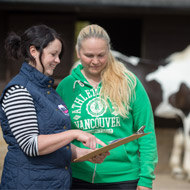
Equitape is to be discontinued from October 2018
Horse health professionals have issued best practice advice on managing worm burdens following news that Equitape is to be discontinued from sale in the UK.
In a joint press release, Westgate Laboratories, Austin Davis Biologics and Professor Jacqui Matthews of the Moredon Research Institute stressed the increasing importance of evidence-based control.
“Wherever possible, we must look to reduce infection risk and break the lifecycle of the worms without overly relying on wormers,”explained Professor Matthews.
“Best practice control should include the following; strategic treatments, targeted (diagnostic test led) treatments, annual tests for wormer resistance, good pasture hygiene such as poo picking and implementing appropriate quarantine procedures for new horses.”
Equitape is the only licenced product for horses containing praziquantel as a single active ingredient. From October 2018, it will only be available in ‘combination wormers’ also containing either ivermectin or moxidectin, the drugs most commonly used to treat small and large redworm.
The researchers state that regular testing should be the focus of any programme to find out if worming treatment is needed to minimise exposure. Worm egg counts should be carried out every two to three months and tapeworm tests every six months, the press release adds.
Consultant vet to Westgate Labs, Carolyn Cummins commented: “With reduced specificity of treatment options, we are concerned that the temptation could be to treat more and test less. However with resistance rising, the only way of identifying problems is by testing routinely, together with resistance testing, to build up a picture of what’s going on.
“Giving a wormer without understanding the worm burden present or without being aware of the efficacy of the wormer you’re using is a false economy for your horse’s health.”
Image (C) Westgate Laboratories



 The Animal and Plant Health Agency (APHA) has updated its online reporting service for dead wild birds.
The Animal and Plant Health Agency (APHA) has updated its online reporting service for dead wild birds.